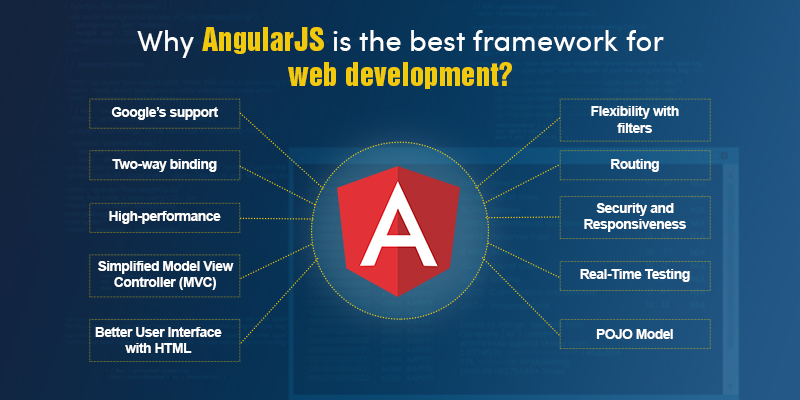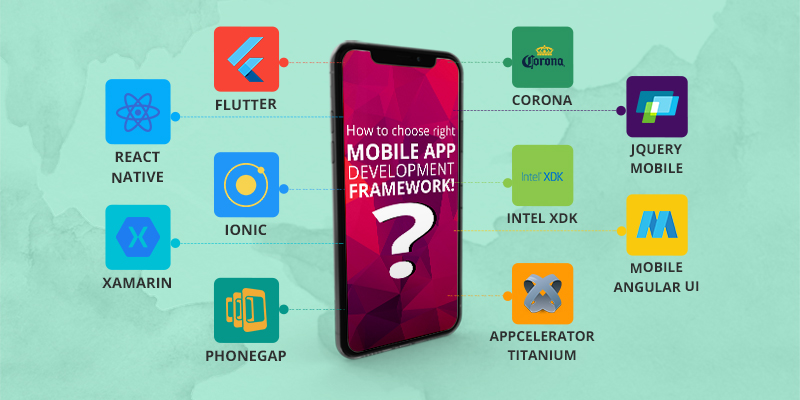AngularJS is thought to be the next big thing in the software world. It is undoubtedly one of the most popular and versatile frameworks available today. Introduced by Google in 2009, this framework has progressively proven its worth in the web development market. It helps to develop the most maintainable and stable apps. As a result, the demand for AngularJS web app development has risen from a few years in the software market.
Let us have a look at why this framework is being preferred on a large scale across the world.
What is AngularJS?
AngularJS is an open-source structured JavaScript framework that supports multiple platforms. It is being largely used for developing adaptable and robust single-page applications (SPA). It simplifies front-end development. In this framework, all the commands and functions use code templates which are written in HTML script. The primary purpose of introducing AngularJS was building SPAs and so, it has a strong list of tools that support SPA development. This framework is ideal for the websites in which the content changes dynamically, as per the behavior and preferences of the end-users. AngularJS is also used for developing enterprise web apps, and Progressive web apps (PWAs).
AngularJS is an open-source structured JavaScript framework that supports multiple platforms. It is being largely used for developing adaptable and robust single-page applications (SPA). It simplifies front-end development. In this framework, all the commands and functions use code templates which are written in HTML script. The primary purpose of introducing AngularJS was building SPAs and so, it has a strong list of tools that support SPA development. This framework is ideal for the websites in which the content changes dynamically, as per the behavior and preferences of the end-users. AngularJS is also used for developing enterprise web apps, and Progressive web apps (PWAs).
Growing demand for AngularJS web app development
This framework has become a leading choice for developers. It comes with features which let the AngularJS app developers create the most robust and scalable web apps. Being interactive JavaScript framework, it helps in building interactive elements and components of a website. Due to its rich features and attributes, AngularJS has emerged to be a universal solution to web development. It’s difficult to imagine the development of a new-age single-page app without using AngularJS.
This framework has become a leading choice for developers. It comes with features which let the AngularJS app developers create the most robust and scalable web apps. Being interactive JavaScript framework, it helps in building interactive elements and components of a website. Due to its rich features and attributes, AngularJS has emerged to be a universal solution to web development. It’s difficult to imagine the development of a new-age single-page app without using AngularJS.
Why AngularJS is the best framework for web development?

Google’s support
AngularJS is developed by Google itself and is maintained by dedicated Google developers. There are highly skilled and enthusiastic engineers for assisting if any technical or maintenance issues arise. This framework has a large community support. If you want any suggestions or get stuck with some technical issues, there are many forums to solve your queries.
AngularJS is developed by Google itself and is maintained by dedicated Google developers. There are highly skilled and enthusiastic engineers for assisting if any technical or maintenance issues arise. This framework has a large community support. If you want any suggestions or get stuck with some technical issues, there are many forums to solve your queries.
Two-way binding
Two-way data binding is used in AngularJS and is considered one of the best features of this framework. It supports automatic synchronization of data between the model and the view. One can develop a template with ease for binding different components and models. The modifications in the user interface will instantly impact the application objects and vice versa. For any module changes, user actions or browser events, the necessary patterns are updated immediately.
Two-way data binding is used in AngularJS and is considered one of the best features of this framework. It supports automatic synchronization of data between the model and the view. One can develop a template with ease for binding different components and models. The modifications in the user interface will instantly impact the application objects and vice versa. For any module changes, user actions or browser events, the necessary patterns are updated immediately.
High-performance
Web developers choose AngularJS because of its robustness, high scalability and ease of maintenance, etc. It is powered by amazing features like filters, directives, content sanitization, form validation, routing, data binding, animations, API client, scope management, form validation, etc. Also, AngularJS supports many tools for providing exceptional performance and outcomes. These help in building high-performing web apps. AngularJS allows producing new elements with the framework.
Web developers choose AngularJS because of its robustness, high scalability and ease of maintenance, etc. It is powered by amazing features like filters, directives, content sanitization, form validation, routing, data binding, animations, API client, scope management, form validation, etc. Also, AngularJS supports many tools for providing exceptional performance and outcomes. These help in building high-performing web apps. AngularJS allows producing new elements with the framework.
Simplified Model View Controller (MVC)
AngularJS web app development uses the original MVC model which is a necessary feature for building dynamic web apps. It is a software architectural setup that maintains data, improves the code quality, reduces the complexity and makes the development faultless by dividing logic, UI and process into separate modules. MVC architecture minimizes the need for writing the code.
AngularJS web app development uses the original MVC model which is a necessary feature for building dynamic web apps. It is a software architectural setup that maintains data, improves the code quality, reduces the complexity and makes the development faultless by dividing logic, UI and process into separate modules. MVC architecture minimizes the need for writing the code.
Better User Interface with HTML
In AngularJS, the user interfaces are built on HTML. HTML is a declarative language having shorter tags and very easy to grasp and follow. The code is lightweight and easy to read and support. The interfaces in HTML are completely well-thought, smooth, organized and structured.
In AngularJS, the user interfaces are built on HTML. HTML is a declarative language having shorter tags and very easy to grasp and follow. The code is lightweight and easy to read and support. The interfaces in HTML are completely well-thought, smooth, organized and structured.
POJO Model
AngularJS web app development makes use of the POJO (Plain Old JavaScript Object) model. POJO provides standard functionalities of JavaScript for object manipulation, so there is no need to add any additional getter and setter functions. The developers need to develop loops of arrays and objects and then reframe or adjust them as needed.
AngularJS web app development makes use of the POJO (Plain Old JavaScript Object) model. POJO provides standard functionalities of JavaScript for object manipulation, so there is no need to add any additional getter and setter functions. The developers need to develop loops of arrays and objects and then reframe or adjust them as needed.
Real-Time Testing
AngularJS has in-built and real-time modules which makes the testing much easier. It supports functional and in-depth testing for every module and allows faster testing of the web apps.
AngularJS has in-built and real-time modules which makes the testing much easier. It supports functional and in-depth testing for every module and allows faster testing of the web apps.
Security and Responsiveness
Being a very flexible and robust structure, JavaScript framework allows implementing third-party libraries and packages. It helps to build responsive apps.
When there is a new update in the framework, data protection and security of the apps can affect. But AngularJS embeds strict security features and makes the apps highly secure.
Being a very flexible and robust structure, JavaScript framework allows implementing third-party libraries and packages. It helps to build responsive apps.
When there is a new update in the framework, data protection and security of the apps can affect. But AngularJS embeds strict security features and makes the apps highly secure.
Routing
Routing simply means the transition from one view to another. It is a significant feature of single page applications. All the content in a single-page application is present on one single page. So, whenever the users click on a menu, they should not be redirected to a new page. Instead, the content should be asynchronously loaded on the same page while just the URLs change, for rich user experience. AngularJS makes routing easier by making various views for different URLs.
Routing simply means the transition from one view to another. It is a significant feature of single page applications. All the content in a single-page application is present on one single page. So, whenever the users click on a menu, they should not be redirected to a new page. Instead, the content should be asynchronously loaded on the same page while just the URLs change, for rich user experience. AngularJS makes routing easier by making various views for different URLs.
Flexibility with filters
AngularJS is flexible with filters. Filters are used for filtering the data before it reaches the view. These are standalone functions concerned with data transformations. They involve functions like reversing the order of an array, formatting decimal places on a number, implementing pagination, filtering an array based on a parameter, etc.
AngularJS is flexible with filters. Filters are used for filtering the data before it reaches the view. These are standalone functions concerned with data transformations. They involve functions like reversing the order of an array, formatting decimal places on a number, implementing pagination, filtering an array based on a parameter, etc.
Key Takeaways:
AngularJS is a promising framework that is helping businesses to develop interactive and user-friendly web apps. It comes with many controls, services, views, models and directories. As compared to other frameworks, this multi-functional framework reduces the coding part significantly. This ultimately reduces the efforts of developers, while speeding up the development process and reducing the chances of errors. It is a highly flexible framework that enhances productivity and expediency. Using AngularJS framework is a win-win situation for both developers and enterprises.
AngularJS is a promising framework that is helping businesses to develop interactive and user-friendly web apps. It comes with many controls, services, views, models and directories. As compared to other frameworks, this multi-functional framework reduces the coding part significantly. This ultimately reduces the efforts of developers, while speeding up the development process and reducing the chances of errors. It is a highly flexible framework that enhances productivity and expediency. Using AngularJS framework is a win-win situation for both developers and enterprises.






